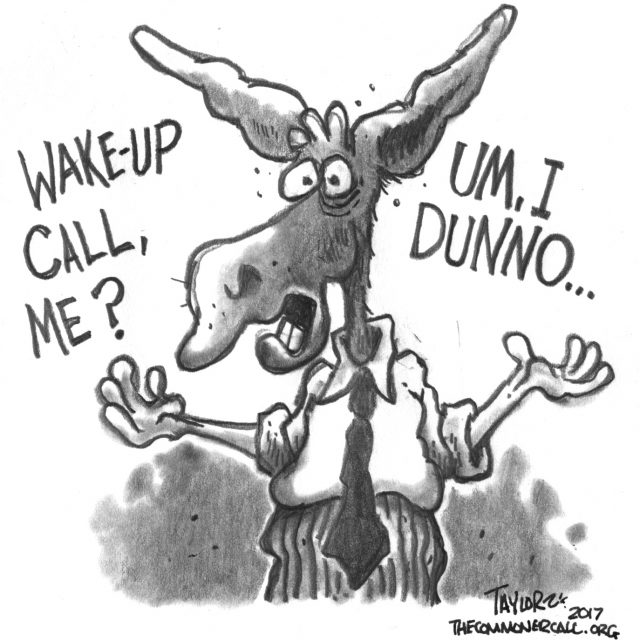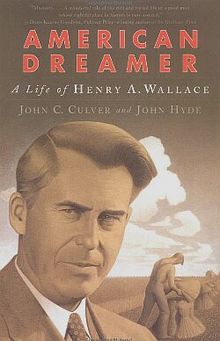
Win for what?
By John Nichols
The Nation (6/15/20)
The simple farmhouse where Henry Wallace was born and came of age can be found in Orient Township, on the southern side of Iowa’s Adair County, just off what is referred to as a minimum maintenance road. Drivers are advised to travel it “at your own risk.” That pretty well sums up the approach that has been taken with Wallace, Franklin Roosevelt’s second vice president, over the 75 years since he battled for the soul of the Democratic Party at its 1944 convention, struggled to keep alive the promise of the New Deal, failed as an anti–Cold War presidential candidate in 1948, and retired to the political wilderness. On the December morning when I visited the farm, no one was there. I brushed the snow off a plaque mounted on a stone that read, “Henry A. Wallace. Birthplace 1888.”

Henry Wallace, FDR’s vice president, argued 75 years ago that Democrats had to go big on economic and social and racial justice. That’s still true.
Wallace had hoped to live to the age of 100. If he had, I like to think he might have attended an Iowa caucus meeting on behalf of Jesse Jackson. In an effort to draw rural voters for his 1988 campaign, Jackson and his supporters set up their Rainbow Coalition headquarters in Adair County, just up the street from the county courthouse in Greenfield (population 1,713). But Wallace died at age 77, barely 20 years after he finished his vice presidency. The death of a former vice president who almost certainly would have succeeded to the presidency had he beaten the corporatists and the segregationists in 1944 was briefly noted. Wallace’s old ideological nemesis, The New York Times, headlined his November 19, 1965, obituary “Ex-Vice President, Plant Expert.” Wallace’s end was not the big story that morning. Rather, it was a report on the burgeoning US military presence in Southeast Asia under another headline, “Casualties High.” Wallace’s funeral took place at an Episcopal chapel near his farm north of New York City. It featured no eulogy, no sermon, and no hymns. A reading from Psalm 46 was chosen (“He maketh wars to cease unto the end of the Earth; he breaketh the bow, and cutteth the spear in sunder, he burneth the chariot of fire”), as was a reading from Psalm 121 (“He will not suffer thy foot to be moved”).
The most prominent of the 300 attendees, John Gardner—who was then Lyndon Johnson’s secretary of health, education, and welfare—had, like Wallace, started as a liberal Republican and become the conscience of a Democratic administration. He brought a wreath of red and white carnations from the White House and said he was honored to pay tribute to “an extraordinary American.” Like Wallace in the mid-1930s, Gardner in the mid-’60s was a true believer in a presidency that sought to balance the scales a little more on the side of the common man and woman. (“To his admirers,” the Times said in his obituary in 2002, “Mr. Gardner was a modern-day Plato, needed by Americans looking for optimism and idealism.”) Unlike Wallace, however, Gardner would not finish his tenure with the administration in which he oversaw the launch of Medicare and championed its War on Poverty. A month before Johnson announced his decision to forgo a bid for reelection in 1968, Gardner quietly left the White House at a point when, the Times noted, “the war in Vietnam was increasingly occupying the president, and the nation’s domestic problems were relegated to a lower priority, as reflected in budget cuts.”
Long, sad story
This was the long, sad story of the Democratic Party in the postwar years. It might see a New Frontier on the horizon or imagine a Great Society, but it never really got around the generals and the profiteers of the military-industrial complex. It might grasp at the promise of hope and change, but it was invariably derailed by the campaign donors and consultants who counseled that it would not do to invoke the hatred of Wall Street, as FDR once had, or to propose, as Wallace did, that instead of an American Century, what was really needed was “the century of the common man.” And yet on that morning in 2018, as I wandered across the barnyard where a young Henry Wallace came to recognize the great possibility of the American experiment, I felt as if the Democratic Party that he had championed, the morally driven and future-oriented party he imagined in 1945, might yet come into being. …
(Commoner Call cartoon by Mark L. Taylor, 2017. Open source and free for non-derivative use with link to www.thecommonercall.org )
*****
The Transactional Moral Emptiness Of Nancy Pelosi
The Rising (7/8/20)
American Prospect Executive Editor David Dayen looks at Rep. Nancy Pelosi’s legislative past and how that influences her response to the pandemic.
*****
Brace Yourself For Trump’s Great Depression, With 20+ Million Evictions, Massive Hunger & 16 Million More Without Health Insurance
[Editor’s Note: Wonder what the Democrats will do? Will they step up to the challenge? It says everything that the question even needs asking. — Mark L. Taylor]
By Robert Rich (7/6/20)
Former Secretary of Labor Robert Reich warns of the looming Great Depression brought on by Trump and the GOP’s refusal to act to mitigate the damage wrought by this pandemic.
Trump and businesses demanded America “reopen” to revive the economy. But we’ve reopened too soon, before COVID-19 is under control. So we’re needing to close or partly close again, which will prolong the economic downturn and wreak even more havoc on millions of Americans’ livelihoods. The wave of evictions and foreclosures in the next 2 months will be unlike anything America has experienced since the Great Depression. And the expiration of expanded unemployment benefits at the end of July will leave unemployed Americans with a 60% income reduction and no stimulus check to fall back on. Meanwhile, state and local governments are forced to gut vital public services like low-income housing and health care — even as over 16.2 million households have lost employer-provided health insurance.
So what’s Trump’s and Mitch McConnell’s response to this looming catastrophe? Do nothing.
This is lunacy. The priority must be getting control over this pandemic and helping Americans survive it physically and financially. Extra unemployment benefits must be extended. The HEROES Act must be signed into law. Moratoriums on evictions and foreclosures must be extended. If it’s necessary to go back to sheltering in place to contain this pandemic, we must be willing to do so. This shouldn’t be controversial. It’s the bare minimum of what our government must do to prevent an even worse economic and human catastrophe.
Anything less is indefensible.
Link To Story And 5-Minute Video

